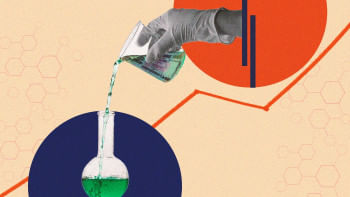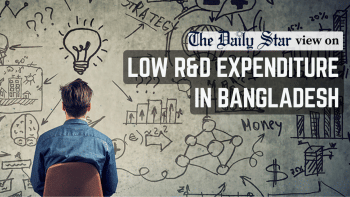Research and innovation need a boost

Bangladesh, characterised by its swift economic advancement and increasing population, finds itself at a pivotal moment in its pursuit of sustainable development. Although the nation has achieved significant progress across multiple sectors such as agriculture, healthcare, and education, the research and innovation landscape has not yet reached its full capacity. When assessed against global benchmarks, the research output and its impact in Bangladesh are still relatively modest. The Global Innovation Index (GII) 2023 places Bangladesh at 105 among 132 economies. Furthermore, a comparative analysis of the percentage of GDP dedicated to Research and Development (R&D) among South Korea, Singapore, China, India, and Bangladesh reveals considerable differences. South Korea stands out with one of the highest R&D investments globally, exceeding four percent of its GDP. Singapore allocates approximately 2-3 percent of its GDP, while China invests around two percent, and India commits about 0.7 percent of its GDP to R&D. In stark contrast, Bangladesh invests less than 0.03 percent of its GDP in R&D, indicating significant potential for enhancement.
A primary obstacle to research and innovation in the country is insufficient funding. This funding shortfall restricts both the scope and quality of research initiatives, hinders the acquisition of advanced technologies, and deters talented individuals from pursuing careers in research. Besides, the research infrastructure in Bangladesh, encompassing laboratories, libraries, and data centres, is mostly outdated and inadequate. Numerous universities and research institutions lack access to modern equipment and resources essential for conducting cutting-edge research. This inadequacy also impedes collaboration with international research communities that depend on advanced technologies and infrastructure.
Moreover, there is a considerable shortage of skilled researchers and scientists in Bangladesh. This issue is partly attributed to brain drain, where talented individuals relocate to developed nations in search of better opportunities. Importantly, while the education system is expanding, it does not yet sufficiently prioritise research-oriented training, resulting in a skills gap necessary for high-quality research. Furthermore, the link between academic research and industry requirements is weak in Bangladesh. The lack of collaboration between universities and industries prevents innovations from being effectively transformed into commercial products or services, thereby limiting the potential economic benefits of research.
It is essential to examine global insights prior to implementing any strategic initiatives. For example, South Korea's research and innovation ecosystem is frequently recognised as one of the most effective worldwide. The country's five-year economic development plans have concentrated on heavy industries and technology, paving the way for swift industrial growth and innovation. Additionally, the government has established technology clusters like Pangyo Techno Valley, which promote collaboration among academia, industry, and research institutions, thereby enhancing innovation. In Singapore, robust intellectual property protection and favourable business environment positioned the country as a prime location for companies that focus on innovation and research. In a similar vein, the Chinese government has played a pivotal role in driving innovation through initiatives such as "Made in China 2025" and actively sought to attract talent through its Thousand Talents Plan. The emergence of technology leaders such as Alibaba, Tencent, and Huawei has further invigorated China's innovation landscape. To summarise, these nations have primarily concentrated on enhancing R&D investment, developing skills, and promoting industry-led innovation.
Drawing from global insights and the current research and innovation framework, several key strategies can be identified. First, Bangladesh must substantially boost its R&D investment by designating a larger portion of the national budget for research and innovation, incentivising private sector contributions through tax benefits, and pursuing international partnerships and funding opportunities. A national research fund, akin to those in India and South Korea, should be established to facilitate resource allocation to key research domains. Additionally, it is essential to modernise and expand research infrastructure to support high-calibre research endeavours. This includes investments in cutting-edge laboratories, high-performance computing resources, and access to international research databases. In addition, the creation of specialised research hubs and centres of excellence in critical fields such as biotechnology, information technology, and renewable energy could facilitate the concentration of resources and expertise.
The shortage of skilled researchers can be tackled by incorporating research-focused training into their universities' academic programmes to emphasise critical thinking, problem-solving, and innovation. Concurrently, the provision of competitive scholarships and research grants may serve to attract and retain talented individuals within the nation. Partnerships with international universities and research institutions can also enhance opportunities for knowledge exchange and capacity development.
Moreover, to effectively connect research with practical applications, the ties between academia and industry should be strengthened. This can be accomplished by establishing technology transfer offices, collaborative research initiatives, and innovation incubators within academic institutions. The government can also contribute by implementing policies that promote collaboration, such as tax incentives for businesses that invest in university-led research and innovation. The creation of a centralised research and innovation authority could facilitate the coordination of these initiatives. Apart from these, implementing structural and policy reforms is essential to cultivate a culture of innovation. This entails promoting creativity and embracing calculated risks, recognising research achievements, and embedding innovation throughout all tiers of education and professional growth.
Research and innovation serve as fundamental catalysts for sustainable development and economic advancement. For Bangladesh, realising its full potential in these domains necessitates a holistic strategy that confronts current challenges while capitalising on the nation's inherent strengths. These initiatives will not only aid in national progress but also establish Bangladesh as a formidable participant in the global knowledge economy.
Dr Mohammad Kamrul Hasan is a public administration researcher and practitioner. He can be reached at [email protected].
Views expressed in this article are the author's own.
Follow The Daily Star Opinion on Facebook for the latest opinions, commentaries and analyses by experts and professionals. To contribute your article or letter to The Daily Star Opinion, see our guidelines for submission.

 For all latest news, follow The Daily Star's Google News channel.
For all latest news, follow The Daily Star's Google News channel. 










Comments